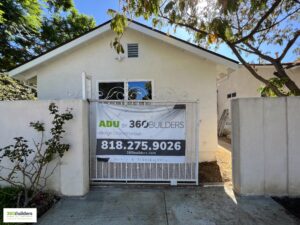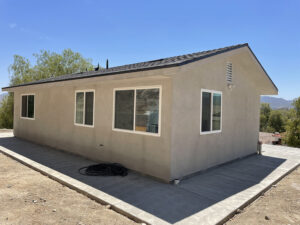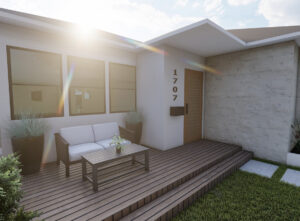The topic of ADUs is a very sensitive issue in Los Angeles. You may wonder why that is so, when opposition to them here pales compared to the fervent battles fought about them in other cities around the United States. The answer lies in property owners’ powerful financial incentives not to allow them on their land; and because they also have effective political clout in LA.
The psychology of property ownership in LA is a major reason why ADUs are not allowed. The culture here is that owning land gives you the right to say who can use it, and what they can do on it. That’s why owners have for many years gotten away with having illegal units operate virtually in plain sight for decades without any consequences. They feel that’s their inherent right.
But when it comes to something that could enhance and prolong the life of their property value, some notable exceptions arise. One is: if it would require any sort of government-type approval process to get final approval for a project on your land (that would require giving information about yourself and/or be subject to public hearings of some sort), then most people will just not go there. That’s the situation for ADUs today in LA, because they require an approval process that often includes neighbors having a chance to say their piece. That kind of government involvement is contrary to the basic psychology of a property owner here, and so it won’t happen.
The other exception is for something that would clearly do you financial good, as in a minor monetary investment with some very high likelihood of producing a large return. Most people would evaluate such an offer and take what seems to be the smart route for them. For example, when it comes to making maximum profit by getting top dollar for their real estate investments, most people will do everything they can to improve their property. So, when it comes to a situation where an additional unit would both help make the property more valuable and also produce new income for them, some owners will go for it if they can afford the penalty (higher carrying costs) from having it vacant while waiting for permits, or until rent payments start producing a profit for them.
Cities are the opposite of LA in this respect. If they have a top-down power structure like ours, then it’s only logical that their priorities will be different from those of individual property owners. The city government must do everything possible to make itself always look good, especially with voters and other city officials. That requires the appearance of being responsive to all citizens, even those who own property within its jurisdiction but are not a part of its power structure or strategically important voting base.
Of course, there will always be people in that jurisdiction who want things done differently from how they are run currently. For cities to continue surviving and growing, those people with different priorities must be made to feel that their concerns are being heard and considered. City officials have a way of doing this: they create public forums at which everyone can express their views on any topic. They only need to do so when it’s politically expedient for them, not all the time. That can occasionally give the impression that they are responding to public pressure, when it’s just a show.
Another way of giving the appearance of being responsive is to give them what they want – but not all at once, and not in a way that would hurt their long-term prospects for survival in office or popularity among voters. City officials have come up with a whole range of ways to do this. Some examples are making sure the neighborhood meetings they hold give everyone in attendance plenty of time and opportunity to air their views, but not so much that it turns into an open-air gripe session without any real issues getting resolved. By giving the appearance that they are listening to what people have to say, they have more success in hiding the fact that they aren’t doing anything about it. After all, when everyone’s talking at once and everything sounds like a wish list, how can anyone be expected to do anything about every little thing?
If only some people – those with money who could make a difference – would speak up for meaningful change, that would show they were serious. But few are willing to do this because it can cause them to be perceived as wrong-headed at best and downright anti-social at worst. They might even end up being ostracized by their neighbors who don’t want to hear from someone like that or face the prospect of change. For most people, it’s better to be dead quiet than risk being branded a troublemaker. That leaves the politicians and city officials free to continue doing things their way while giving people the impression that they are open to new ideas.
Of course, it would be nice if more people did speak up for meaningful change. But in many cases when someone does have the courage to do that, the city will make sure that their efforts end up being for nothing. They might even find themselves getting blamed for not acting when they tried to invoke the spirit of change instead of improving things gradually. The city could do this in a number of ways, such as by having its officials or agents act like they support the effort, or even make it seem that they are taking some meaningful action. But when push comes to shove and the city is forced to take a stand on an issue of public concern – such as allowing ADUs in residential neighborhoods – it will always do so in favor of maintaining the status quo. If for no other reason than because standing unequivocally against change is the safest and easiest thing to do from a political perspective.
One-way cities have been able to disguise their efforts as being responsive to the public while still retaining the status quo is through what amounts to symbolic action or baby steps. These can make it seem like things are getting done, but without causing any meaningful disruption of how things were previously done. The public sees the result of these efforts and thinks that their voices are being heard and acted upon. But, they’re only being pacified.
The city could also take baby steps by allowing a few ADUs for special cases that don’t involve much disruption to existing neighborhoods – such as those properties which already have some sort of commercial or industrial use. It could also give a few neighborhoods the chance to experiment with it, such as through pilot programs run by neighborhood councils where people could see first-hand how ADUs might benefit them and their communities if they get a chance to try them out for themselves in real life.
This way, there would be no risk of things falling apart due to over-rapidity and the city could still maintain the status quo. It would also make it easier for any politician or official who got behind such efforts to point to them as an example of their interest in making things better for ordinary citizens – not just those with a lot of money or influence.
The problem is that most politicians and officials don’t have any real intention of changing the status quo – or will only do so if it’s necessary to avoid a public relations disaster. Even if they go through one of these short-term efforts, they’ll be careful to choose baby steps that won’t end up harming them politically by allowing change to come too fast for people to easily digest and cope with. Because if they do anything else, then the public might go looking for someone who has more of a backbone and is willing to stand up for meaningful change – such as by supporting efforts to allow ADUs in residential neighborhoods in LA.
The problem with baby steps is that people don’t see much point in them. After all, if they are going to act at all it will be for something meaningful – such as changing the rules that currently prevent anyone from building an ADU on their property. It’s also likely that the people interested in taking such baby steps won’t be there forever. Eventually, they’ll move on and leave others to pick up where they left off, only to be in the same situation all over again a few years later when someone else tries to initiate meaningful change.
Therefore, so many people in LA are ready, willing and able to take meaningful action right now. There’s no need for anyone to stick around forever or try to hold off change indefinitely. It’s just a matter of getting organized, setting up an official organization if necessary and then taking the steps needed to bring about meaningful change.
To be successful in this, people will need to maintain the public’s support – which means they can’t be satisfied with anything short of success. This is because if a group fails to deliver on their promises, it will make them look bad and give their opponents yet another reason for not allowing ADUs in residential neighborhoods. It would also be harder for future groups to take meaningful action if no one is willing to give them a chance.
So, the public will have to be involved in making these decisions for themselves and they’ll have to feel confident that any organization they work with has the skills and ability needed to succeed. But given how many people in LA are looking forward to allowing ADUs to help them cope with the high cost of housing and steep rent increases, it shouldn’t be too hard for local organizations to find volunteers and supporters.







